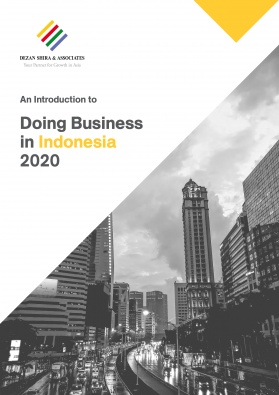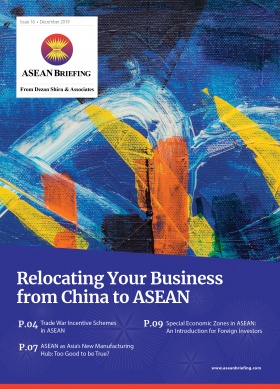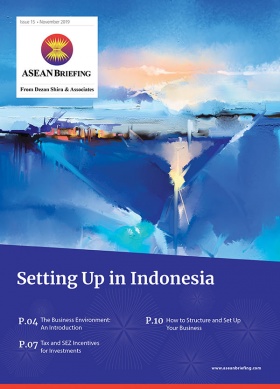Indonesia Launches National Economic Recovery Program
- Indonesia launched the National Economic Recovery program on May 11, 2020, which provides the latest stimulus policies for the economy.
- The program is estimated to cost US$43 billion and comprises of tax breaks for industries, capital injections to state-owned companies, and liquidity support for the banking industry, among others.
- With the launch of the program, the country’s budget deficit is expected to reach 6.7 percent of GDP in 2020, much higher than the anticipated 5.07 percent of GDP.
On May 11, 2020, the Indonesian government issued Regulation 23 of 2020 (Reg 23/2020) on the implementation of the National Economic Recovery (NER) program, which sets out the latest stimulus policies to soften the economic impact caused by the pandemic.
The program, estimated to cost US$43 billion, is an expansion of the incentives in the stimulus packages issued in February and March 2020. The NER comprises of tax breaks, capital injections for state-owned enterprises (SOEs), interest subsidies for micro, small, and medium-sized (MSMEs) enterprises, liquidity support for the banking industry, as well as financial assistance for vulnerable households, among others.With the introduction of the NER, the budget deficit has swelled to 6.27 percent of GDP, much higher than the anticipated 5.07 percent of GDP. In providing assistance to SOEs, the government has stated this will only apply to SOEs engaged in strategic roles, such as transportation and energy.
Tax incentives for more industries
The government has allocated 123 trillion rupiah (US$8.3 billion) in tax incentives for more industries.
This includes reducing the corporate income tax (CIT) rate from 25 percent to 22 percent for the 2020-2021 tax year. This will be further reduced to 20 percent for the 2022 tax year.
Employees earning below 200 million rupiah (US$13,000) working in certain sectors will be exempted from paying income tax. These sectors are:
- Agriculture, forestry, fisheries;
- Mining and quarrying;
- Processing industry;
- Electricity, gas, steam, and cold air suppliers;
- Water management, wastewater, waste recycling, and remediation activities;
- Construction;
- Wholesale, retail, repair, car, and motorcycle maintenance;
- Freight and warehousing;
- Hotels and accommodation providers, F&B;
- Information and communication;
- Financial activities and insurance;
- Real estate;
- Professional scientific and technical services;
- Rental activities, warehouse rental business, employment, travel agents and other business support;
- Education;
- Human health and social activities;
- Tourism, arts, entertainment, and recreation industry; and
- A company whose activities are located in special bonded zones.
The government will bear the 0.5 percent income tax on businesses having a gross annual turnover of 4.8 billion rupiah (US$326,000) as stipulated under Ministry of Finance Regulation 23 of 2018, from April to September 2020. Income tax for these sectors will also be reduced by 30 percent for the same time period.
Furthermore, for the aforementioned industries, the government will relax value-added tax (VAT) refunds, as well as the deferral on import tax payments. Taxpayers will need to submit a VAT tax return overpayment refund for the period April-September 2020 with a maximum value of 5 billion rupiah (US$340,000).
Interest subsidies for MSMEs
In assisting the immediate cashflow of MSMEs, the regulation will enable the government to provide interest payment subsidies ranging from two to six percent.
This incentive applies to the 26 million or so borrowers of the government’s Ultra-Micro Financing Program and the Women-based Financing Program. A further 28 million borrowers of the national Micro-credit Program who take out loans between 10 million rupiah (US$654) and 500 million rupiah (US$33,000) will have their loan repayments suspended for the next six months.
SMEs who have borrowed between 500 million rupiah (US$33,000) and 10 billion rupiah (US$668,000) are eligible for three percent interest subsidies for three months and two percent for the next three months.
Finally, six million farmers will be eligible for interest subsidies of six percent for a period of six months.
To be eligible, MSMEs must ensure they have a valid tax number, and are not blacklisted by the Financial Services Authority (OJK), the agency that regulates the financial services sector. Additionally, they must also have a good history of loan repayments before the onset of the pandemic.Working capital for MSMEs
State-owned investment management company Bahana Pembinaan Usaha Indonesia will receive 6 trillion rupiah (US$408 million) to strengthen state-owned insurance providers Askrindo and Jamkrindo, in their capacity to provide credit guarantees to MSMEs.
Funding for banks
Through this measure, the government will provide funding up to 87 trillion rupiah (US$5.9 billion) to commercial banks (participating banks) who will provide liquidity to banks (implementing banks), which are providing working capital for MSMEs.
To participate, these commercial banks need to fulfil several criteria:
- The bank must be a commercial bank and incorporated as an Indonesian entity, with at least 51 percent of shares owned by an Indonesian citizen/legal enterprise;
- The bank must be categorized as healthy by the Financial Services Authority (OJK); and
- They must be categorized as a top 15 bank by asset size.
Upon receiving the funds, participating banks can provide the liquidity to the implementing banks, provided they are for financing/working capital for MSMEs or for rural/shariah banks undertaking the same measures.
A commercial bank can also become an implementing bank and receive the liquidity buffer if:
- They are categorized as healthy by the OJK; and
- The bank is a holder of government securities, Bank Indonesia Deposit Certificates, Bank Indonesia Sukuk and Shariah Certificates, and Bank Indonesia Certificates, which are not subject to any repurchase agreements that add up to no more than six percent of the bank’s third-party funds.
Working capital for SOEs
More than 44 trillion rupiah (US$2.9 billion) has been allocated to certain state-owned enterprises who are deemed ‘crucial’ to the economy. The companies are mentioned below:
- State construction company, Hutama Karya, was allocated 11 trillion rupiah (US$748 million);
- State electricity company, Perusahaan Listrik Negara (PLN), was given five trillion rupiah (US$340 million);
- National carrier, Garuda Indonesia, who was allocated 8.5 trillion rupiah (US$578 million);
- Financial services providers, Permodalan Nasional Madani, who was allocated 2.5 trillion rupiah (US$170 million);
- Major operator of public railways in Indonesia, Kereta Api Indonesia, was given 3.5 trillion (US$238 million);
- Perumnas, the SOE engaged in the building of houses and settlements, was given 650 billion rupiah (US$44 million);
- Perkebunan Nusantara, a company engaging in plantations, has been given to four trillion rupiah (US$272 million);
- Krakatau Steel, the largest steel producer in the country, was allocated three trillion rupiah (US$204 million);
- Investment management and banking firm Bahana Pembinaan Usaha Indonesia, was given 6.2 trillion rupiah (US$421 million); and
- Indonesian Tourism Development Corporation was given 500 billion rupiah (US$34 million).
In addition to the US$340 million in funding for PLN, the company has been given 45 trillion rupiah (US$3 billion) in compensation payments by the government. State oil company Pertamina has also been given the same amount in compensation payments.
Support for consumer spending
The government has provided 172 trillion (US$11.6 billion) in funding for social programs. These are intended to impact laid-off workers and vulnerable households.
The funds will be distributed among several charitable programs. These include 37 trillion (US$2.5 billion) allocated for the Family Hope Program, which provides educational and health facilities to low-income households. 43 trillion rupiah (US$2.9 billion) has been designated to the Staple Food Program, which will assist more than 15 million people, and 20 trillion rupiah (US$1.3 billion) for the government’s Pre-Employment Program, among other measures.
Assistance for government ministries and regional administrations
Government ministries, in particular those dealing with housing and tourism, are eligible to receive 65 trillion rupiah (US$4.4 billion) whereas regional administrations have been supported with 15 trillion rupiah (US$1 billion) in funding.
Biodiesel program
The government’s biodiesel program, in which the country has produced biodiesel containing 30 percent palm-based fuel, has been given subsidies worth 2.7 trillion rupiah (US$183 million).
About Us
ASEAN Briefing is produced by Dezan Shira & Associates. The firm assists foreign investors throughout Asia and maintains offices throughout ASEAN, including in Singapore, Hanoi, Ho Chi Minh City and Jakarta. Please contact us at asia@dezshira.com or visit our website at www.dezshira.com
- Previous Article China Plus One Series: Understanding Malaysia’s Appeal to Foreign Investors
- Next Article Das Steuersystem in Singapur












